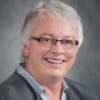As the 2026 President of the Society of Petroleum Engineers, Jennifer Miskimins is preparing to lead the organization through a year of transformation, outreach, and technical progress. With a longstanding commitment to both industry and academia, she brings a unique perspective to the role—only the third SPE president from academia and the sixth woman to hold the position.
In this exclusive Q&A, Miskimins shares her roadmap for the year ahead, touching on key initiatives, the importance of member engagement, and how SPE can evolve to meet the changing needs of the energy sector.
Jennifer L. Miskimins is a professor and the department head of the petroleum engineering department at the Colorado School of Mines (Mines), where she holds the F.H. Mick Merelli/Coterra Energy Distinguished Department Head Chair.
She has over 35 years of experience in the petroleum industry, starting with Marathon Oil Company as a production engineer and production supervisor. Miskimins began teaching at Mines in 2002 and has held various appointments since then. From 2013 to 2015, she held a part-time appointment at Mines while working at Barree & Associates. In 2016, she returned full-time to the university and has served as the department head since 2019.
Miskimins served as the first Completions Technical Director on the SPE International Board of Directors from 2015 to 2018. She was an SPE Distinguished Lecturer in 2010–2011 and 2013–2014 on hydraulic fracturing in unconventional reservoirs. She was awarded the 2014 SPE Completions Optimization and Technology Award, the 2022 SPE Distinguished Achievement Award for Petroleum Engineering Faculty, and is an SPE Distinguished Member.
Miskimins has served on numerous conference organizing committees, including chairing the 2023 and 2024 SPE Hydraulic Fracturing Conference and Exhibition, and as a technical editor for SPE journals, including serving as the executive editor of the Production & Operations Journal for 3 years. She was the editor in chief for the 2019 SPE Monograph update “Hydraulic Fracturing: Fundamentals and Advancements.” Miskimins served on the AIME Board of Trustees from 2018 to 2024 as an SPE trustee and was the 2022 AIME President.
She holds a BS from the Montana College of Mineral Science and Technology and MS and PhD degrees from the Colorado School of Mines, all in petroleum engineering.
PB: Jennifer, welcome and congratulations. Thank you for joining me today.
JM: Thanks, Pam. It is indeed an honor to be sitting in this position today.
PB: Let’s go ahead and dive into some of your thoughts, as you’ll soon be taking this role. First, what are the main goals for your presidency, and how do you hope to shape the future of SPE during your term?
JM: This is always a good question, a good place to start off, isn’t it? So, SPE has a new tagline, and some people might have heard it, others might not, but the new tagline for the Society of Petroleum Engineers is ‘Solutions. People. Energy.’ And obviously that’s a little bit of a play on our name, but I think it does a really wonderful job of summarizing what SPE is all about.
We’re a member-driven Society. We provide the world with energy needs, and we have the solutions to do so. Building on that, what I’d like to do is to help provide some ways to help our membership with the public perception of SPE and the good our industry does when it comes to providing energy and raising the standard of living worldwide.
I always like to take the opportunity at this point in time to point out that we are a not-for-profit organization, and we can’t lobby. We’re not here to lobby governments about what the oil and gas industry does and needs, and I think that’s a really important thing for our members to realize. But I do believe we can do a better job of explaining to the general public the importance of what we do and to advocate for ourselves.
I hope, through some of my conversations with our members and other communications, that I can help to provide people with some tools to help with this public perception. We provide these solutions for energy needs, and the general public should understand that and the critical importance of such. Turning to the people side of Solutions. People. Energy. I want to work on providing people the opportunity and desire to engage in SPE at all stages of their careers, whatever level that is.
We’re still talking about the ‘new normal’ after the COVID-19 pandemic. That goes for professional societies also. Whether it’s SPE or other professional societies, membership is unfortunately decreasing, and we need to make sure that all levels of SPE membership have an opportunity to contribute wherever their desire and passion is to help maintain our membership levels.
I think that goes especially for young professionals and students. Obviously, as an academic, I have a soft spot for students, but there are studies where people in that generation are showing less interest in professional societies. We need to make sure that they see a home for themselves in SPE and can help contribute to the future.
So, those are the philosophical areas. There are some more tactical areas that we’re going to need to address also. Post-pandemic, SPE has been facing some significant budget issues, and my predecessors have been working very, very hard on that, along with the SPE Board of Directors. We’re going to need to continue to do so. Another tactical area is we’re at the point where we need to update our strategic plan. These areas that I mentioned—solutions, people, energy, and the budget—are really going to factor into the strategic plan. So, there’s maybe a long answer to your question, but these are some of the things that I’m planning to focus on during my term.
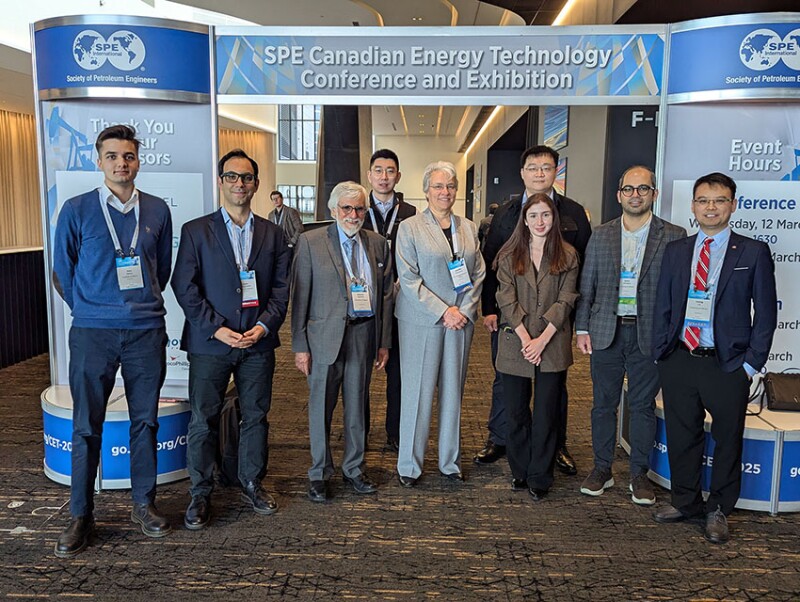
PB: I think just taking two items of what mentioned leads to my next question. What do you see as some of the challenges coming for SPE and the petroleum engineering profession in general? For example, you mentioned public perception. That has been identified as something that increasingly needs to be addressed in today’s world, along with encouraging the further engagement of students. Could you explain a bit more about what other types of challenges you see?
JM: When I look at the bigger picture of petroleum engineering, there has been, and obviously is, some concern with the reputation of the industry. I deal with this almost on a daily basis, and I think anybody that’s working a petroleum engineering program or course of study is dealing with this when we look at recruiting students into the petroleum engineering discipline, or any of the disciplines that might be aligned with the petroleum industry.
I think we really need to start focusing more on being proud of what we do. Not shy away from the fact that we provide increasing standards of living for people around the globe by supplying energy and doing it in very clean and sustainable ways. This isn’t something that SPE can solely do as an entity. I don’t have any misconceptions about that, but I also believe that as individuals, we can help contribute to changing attitudes by providing some insight, and SPE can help provide the tools to do such.
The other challenge, and this is a big one, is the changing attitude about society memberships I mentioned earlier. We are seeing some decreases in membership enrollment with SPE. And again, SPE, and really any professional society, is seeing this change. Olivier Houzé, who’s my immediate predecessor as the 2025 President, has focused on showing some of the sharp drop-off we have with young professional membership. I’d like to continue to see us engage with the young professionals and see what we can do to help mitigate some of those issues and gain insights into why this attitude is changing about society memberships. And just make sure that everybody at all levels of SPE membership feels included and feels an opportunity to contribute to the Society and have SPE contribute to what they want to see also as a member. I don’t think that we can fix all the problems, but we can sure start to chip away at some of these.
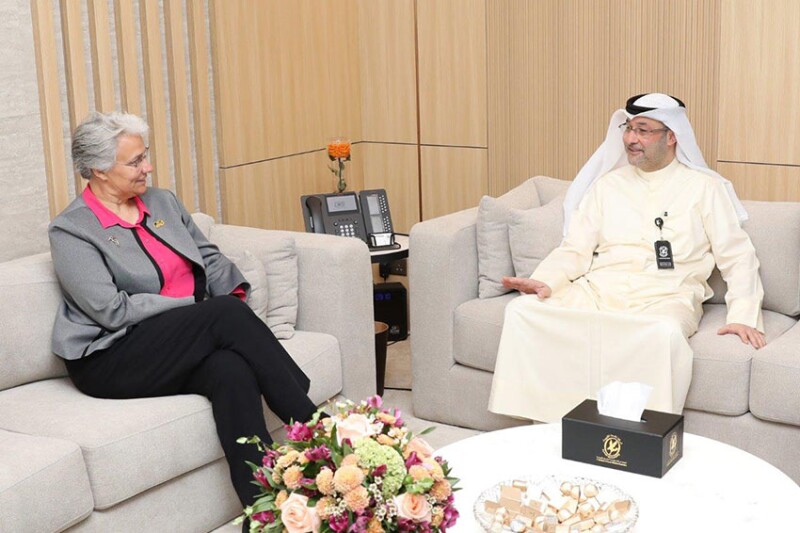
PB: You have a few decades of experience behind you. I’m sure you have seen this evolution over the course of your career from, let’s say when you began, of these views about the industry overall. Along with that, changes in what is considered important, especially from the perspective of today’s young professionals, students, and their priorities. How do you think your experience in the industry, your role as a professor of petroleum engineering, and your extensive history as an SPE member have prepared you to become SPE president?
JM: I kind of like this question. It’s funny because my first response since being nominated, and it still holds true, is that I’m not really sure anything can completely prepare you for this role. I mean, it’s so broad and worldwide and diversified. We all come with our different experiences and backgrounds and those drive how we see the world. I don’t think anything, even with my varied background in industry and academics, can allow me to fully understand what everybody else’s history or interests are. I may be a jack of all trades, master of none in the sense that I’ve been a student member, a professional member, worked in industry, and worked in academics. As my bio shows, I’ve been involved in a multitude of different areas with SPE. So, I hope it gives me a glance into the various areas that people have an interest in. That being said, I definitely want to put out there to people that if I’m not seeing something through their lens correctly, please reach out. Let me know. Let me know your thoughts. I’m here to learn and to serve.
I do have some thoughts, as we’ve discussed, about what I’d like to accomplish as president, but I’m obviously not a young professional anymore. I’m obviously not a student anymore. So, if there are things that I need my eyes opened to reach out to let me know. I think we’re all here to make SPE a better place, and I’d like to see what we can do to drive that.
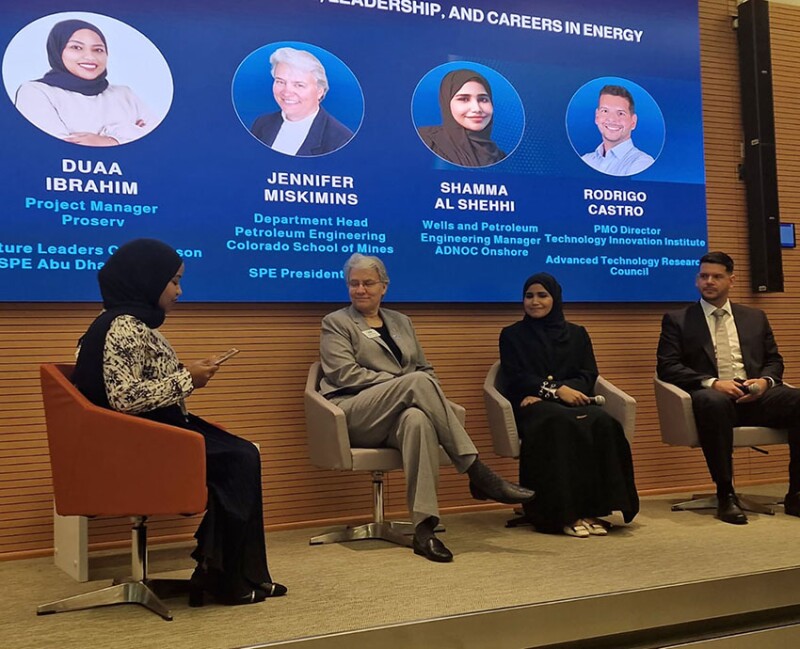
PB: Okay, I’d like to now jump into some of the more technical aspects that affect our industry. What trends or emerging technologies do you think will most significantly impact our industry in the next few years?
JM: This is a pretty long list, and it’s very specific to some of the areas that people work in, but there are a couple that are universal. The first one, and this one was actually kind of easy to come up with, artificial intelligence (AI). AI is everywhere. And I don’t think a lot of people, myself included, are completely aware of all the areas that it’s really started to impact our industry, whether it’s in the office or whether it’s in the field. I mean anything from taking and summarizing meeting minutes to analyzing drone footage coming in from the field to see if there are leaks occurring.
I think we’re just now scratching the surface of what that’s going to do and how much more predictive it’s going to become. That being said, I know there are a lot of people that are concerned about loss of positions, or AI taking over jobs entirely. I don’t believe that’s the case. It really is a tool that’s going to help us understand things a little bit better and how we can improve what we do. Ideally it will help to eliminate many of the mundane tasks and allow us to be able to focus on being more creative and applying that creativity. I think we’re going to see a lot of changes in this area in the next few years.
Another one that’s pretty universal and we hear a lot about, is that decarbonization continues to be very high on the list. I hear this from potential students all the time. They hear that there’s not a future in the industry, but when you talk with them, it’s important to help them understand it’s not going away. We’re going to need to produce more gross amounts of oil and natural gas and energy in general in the future than we are even now. That’s going to continue to be a challenge. Net zero doesn’t mean zero production by any means, so that’s offering a lot of opportunities too, right? We’ve got to do things better in the future than we have in the past, so I think that’s going to continue to significantly impact our industry.
Something more regional, as we investigate unconventional reservoirs around the world will be water. Water conservation. You hear in the Permian Basin that water really is the new oil in the sense that it’s driving the production and how many of the operations that are being conducted. I believe we’re going to continue to see a lot of focus on that in the future. So, like I said, the list is long, but those are the top areas that I see coming.
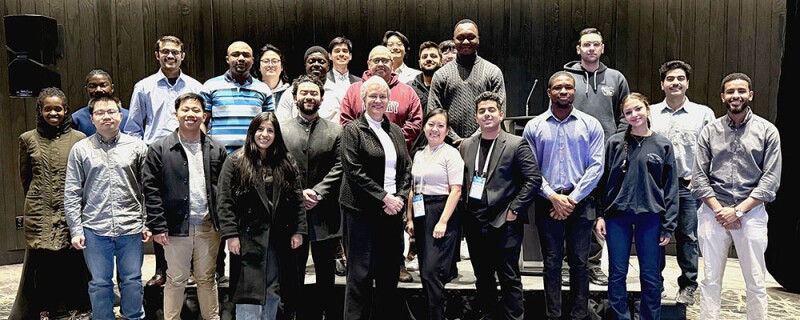
PB: SPE has a very diverse membership, certainly in where its presence is, as well as our members range from very young, fresh out of college, and our students not yet out of college, up to our more experienced professionals. How do you see SPE’s role evolving to meet the needs of both experienced and young members who may be entering the industry?
JM: I don’t necessarily like to read things during interviews, but I’m going to quote SPE’s value proposition statement, which has come out in recent months. At SPE, ‘we deliver solutions and empower people to drive the energy industry forward. SPE members gain access to premier programs, content, and events designed to accelerate professional growth and career development while fostering a strong network and sense of community. Our commitment is to ensure members receive exceptional service and support and relevant communications.’
In answer to your question, I believe this does a really good job of summarizing what SPE strives to bring to its members, no matter what their needs are or where they are in their careers. We can’t be all things to all people. We can’t do everything. There are budget constraints and other considerations, but we have to continue to listen to what our members want. Whether they’re experienced professionals, whether they’re YP’s, whether they’re students—and respond to those needs.
As an example of how SPE has evolved, I was on the board of directors starting in 2015. At that point in time, we had around a dozen technical sections, if that many, and they were something relatively new. Now, 10 years later, we have 24. These were all started and driven by very passionate members with global interests in these particular areas.
That’s an example of how SPE’s has evolved to say, okay, we have these 24 areas. There’s global interest in them. People are very, very passionate about them. By providing a platform and an opportunity to see where some of these interests lie, that’s where SPE can really help connect people. And again, they are very member driven. Somebody has an idea, they have colleagues that want to drive those topics forward. It gives us a great opportunity to do that. SPE has done a pretty good job of evolving to do that at all levels of experience, and we hope to continue to do so.
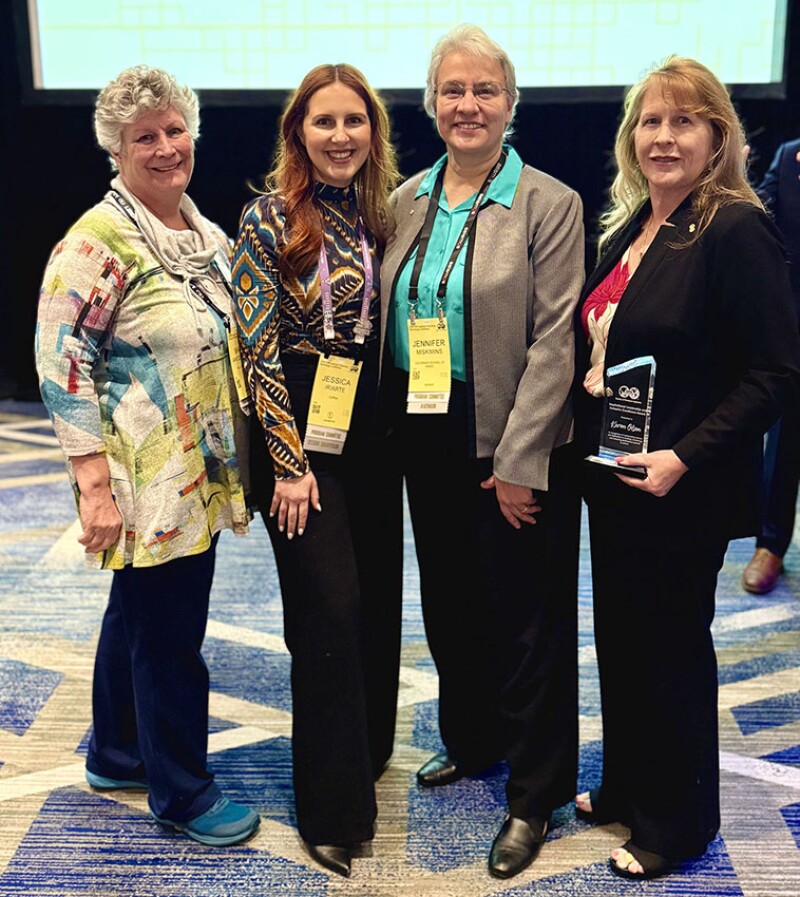
PB: You may have touched upon another point I wanted to ask you about in terms of our technical sections. Of course, we have a variety of geographical sections as well, and I think that also could help in further engaging young professionals. And what kind of other advice would you pass along to young professionals who are aspiring to make an impact in the sector?
JM: I’m going to come back to a term I used a minute ago. If you have a passion, there’s going to be a role for you. And you know, things are going to be rough at times, and our industry is cyclic. There’s no doubt about that. But if there’s one thing that I’ve noticed throughout my career in academics or the industry side of things … if you’re passionate, there’s a role for you.
My advice would be to let that passion guide you. Find others with similar interests, whether that’s in a regional section for members or students in a chapter, or if it’s technical sections, conferences, or regional meetings. Whatever it is, let that passion guide you. Find others that have similar interests and be willing to serve to drive them forward.
That’s something that I’m going to twist a little bit. SPE can do a lot of things for its members, but the members also need to do some things for SPE. You’ll find that some of the most rewarding and impactful contributions you can make are through a society like this. Might not come with a paycheck, but it does come with some really rewarding feelings and contributions that come out of it. In this case, the intangibles might be more important than the tangibles, and likewise, the intangibles can become very tangible benefits in the long run.
That’s the kind of advice I give to young professionals or students if they want to make an impact. I think that leads to networking and leads to the ability to find mentors, both formal and informal. And those leads might lead to the next answer to a technical question, or the next job opportunities. So, find what you love and go for it.
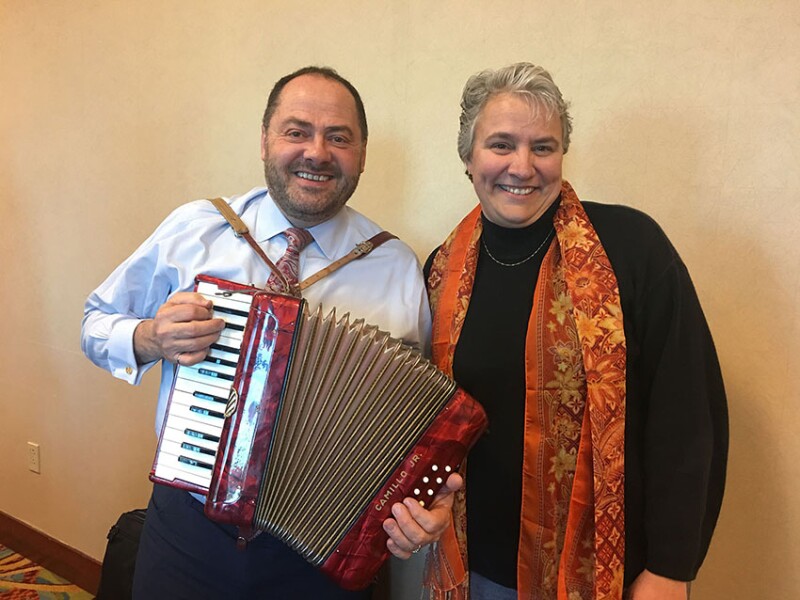
PB: I think that’s very good advice, and it applies so much to anyone’s life in general, it really does.
JM: I agree.
PB: Can you share a professional challenge you faced and how it shaped your leadership approach? I think, given your remark about having that fire, that passion, it seems that certainly influenced how you may have found your way.
JM: You’re right. Many of the roles I’ve taken over time were because I’ve had a passion or an interest in finding out more about that particular area. A professional challenge that I had? It’s not a fun one, but it was a challenge.
I was the department head of petroleum engineering at the Colorado School of Mines for about 6 months when the COVID-19 pandemic hit. And if there was something that maybe changed my leadership approach or helped shape what I do, it probably was that.
I’ve been a rule follower all my life. I think all my friends and colleagues would tell you that. But, what do you do when there are no rules? Right? We were all navigating something new. My job at that point in time was to make sure people remained safe and also try to make sure people continued to get the education that they needed. I think it shaped me to be more of a listener and to really hear people.
Going back to some of our earlier conversation, it was gaining understanding through somebody else’s lens what they were dealing with under those circumstances. Understanding the importance of communication better and just how critical it is to listen and actually hear.
Anyone who has been in leadership roles deals with challenges, but if I had to pick one, that might be the biggest professional challenge I’ve ever had.
PB: That’s one worthy of a star or two. That’s a big one. Is there anything else you’d like to add? Is there something that I didn’t touch on that you would like to bring to the attention of our members?
JM: I get asked this question a lot: Whether being SPE President is something I always wanted. I’m very upfront about that. No, it was never on my radar. It was something that came to me. As more and more people asked me about it, I started to consider it more seriously.
So no, it never was, but I promise to all the listeners and the readers that I am here now, and I’m going to give it the best I can and give the SPE membership everything that I have. I’m very much looking forward to the role and its challenges.
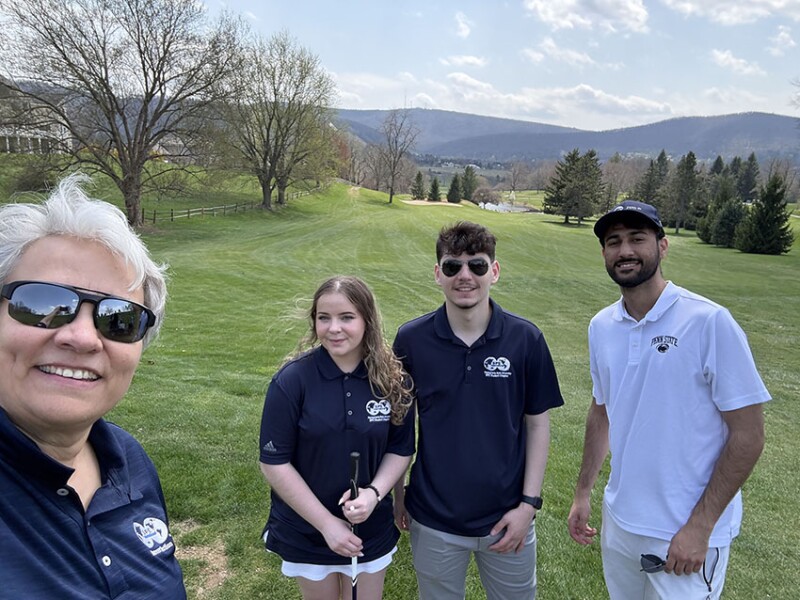
PB: Thank you so much for sharing your insights, experiences, and a bit of your vision for the future of SPE in our industry. It’s been a real pleasure speaking with you, and we’re looking forward to seeing your leadership in action as you take the reins as president at ATCE.
To our podcast listeners, I want to thank you for joining us, and don’t forget, beginning in October, you can read Jennifer’s monthly columns in JPT for ongoing thoughts and updates as she steps into her role. If you enjoyed this episode, be sure to share it with your colleagues, and you can find more conversations like this, along with the latest technical content and industry news on the SPE and Journal of Petroleum Technology websites. Thanks for listening.
Full Podcast available here.
You can contact the SPE President at President@spe.org.


